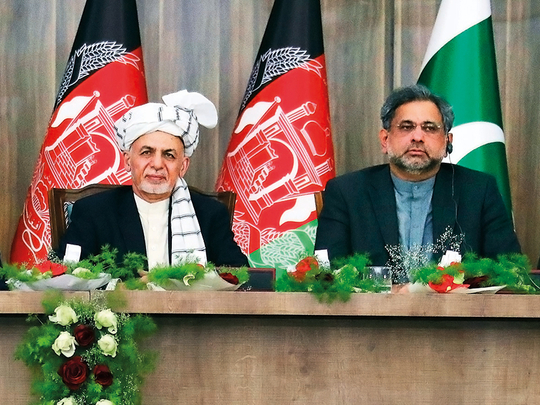
Islamabad: Pakistan is still mulling Afghanistan’s recent overtures, including an invitation that Pakistani prime minister visit Kabul — an offer that analysts see as a good sign, underscoring that dialogue between the two often uneasy neighbours is key to defeating militants on both sides of the border.
Islamabad says it wants to consult the country’s political and military leadership before accepting Afghan President Ashraf Gani’s invitation, which followed a visit last weekend to Kabul by Pakistan’s National Security Adviser Nasser Janjua and also last month’s offer by Gani of unconditional talks with the Taliban.
The Taliban have not responded yet but Pakistan’s foreign ministry spokesman Mohammad Faisal told journalists on Tuesday the country’s political and military leaders are carefully considering the invitation before drafting a proposal for Prime Minister Shahid Khaqan Abbasi.
“All stakeholders will consider the invitation in order to prepare a brief for the prime minister, who will decide about his possible visit to Kabul,” Faisal said.
Gani delivered the invitation for Abbasi during his meeting with Janjua, who also held talks with his Afghan counterpart, National Security Adviser Hanif Atmar.
The meetings were a bright spot in an otherwise acrimonious relationship between Pakistan and Afghanistan, which routinely trade accusations that each country harbours militants who attack the other.
Since the beginning of the year, Pakistan has been under increasing US pressure to end what Washington says are safe havens for militants, particular those of the Haqqani network, which is blamed for some of the most horrific attacks in Kabul. Pakistan denies the accusation but Washington still went ahead and suspended military aid to Pakistan that could total more than $2 billion (Dh7.34 billion).
The last time a Pakistani prime minister was in Kabul was in 2015 and a visit by Abbasi now would be hugely significant.
“It’s an opportunity Pakistan should consider with an open heart,” said Hasan Askari, a Lahore based analyst. “Improved relations with Afghanistan would be in Pakistan’s interest and will help stabilise the region.”
Moonis Ahmar, professor of international relations at the University of Karachi, said the gesture is welcome but that more trust is needed between the two countries.
Also, the decades-old dispute between Pakistan and India figures prominently in Islamabad’s relationship with Kabul and finding a route to peaceful coexistence will have to take into account those sentiments, Ahmar added.
Pakistan is concerned over India’s increased influence in Afghanistan and accuses New Delhi of using Afghan territory to foment unrest inside Pakistan, particularly in the restive southwestern Balochistan province.
Gani’s invitation comes on heels of the Afghan president’s peace offer to the Taliban last month, in which he offered unconditional talks. Pakistan, which lauded Gani’s offer, is considered to be the only party that can bring the Taliban to the negotiation table.
Pakistan’s prime minister also held an unscheduled meeting with Vice President Mike Pence last Friday, causing some to suggest there could be a warming in the US-Pakistani relations.
How that plays into Gani’s offer remains to be seen.
Imtiaz Gul, who heads the Islamabad-based Centre for Research and Security Studies, said Afghanistan’s leaders see the dividends of burying the acrimony that has characterised past relations with Pakistan.
Still, Gul said, talks between Kabul and Islamabad can succeed only if India drops its opposition to the economic corridor China is developing jointly with Pakistan linking the Arabian Sea port of Gwadar to China.
Kabul-based analyst Waheed Muzhda says he is not optimistic of an early thaw, stressing that Afghans remain distrustful of their neighbour and that for Kabul, simply, “Pakistan is not honest.”
Muzhda said the overtures were being made to Pakistan because both the United States and Afghanistan fear stepped-up fighting with the coming warm weather and would like to see Islamabad pressure the Taliban to talk peace rather than continue fighting. But Pakistan’s influence over the Taliban is overstated, he added.
Javid Faisal, deputy spokesman for Afghanistan’s Chief Executive Abdullah Abdullah, said Pakistan could acquiesce to talks with Afghanistan mainly because of international pressure.
“What we want from Pakistan is more evidence that they can be trusted,” he said.












